The Olympic Games not only bring together elite athletes to compete on a global stage; they also give host nations a way to showcase their countries to the world. Successfully using the Olympics as advertisement can result in a tourism boom with financial rewards long after the closing ceremonies. The trick is to throw the world’s biggest party without going bankrupt in the process.
Hosting the Olympics is a financially risky proposition, one that begins a decade before the events are actually held. Cities compete to convince — first their own countries, then the International Olympic Committee — that they are the right venue: Safe, with convenient transportation, plus efficient and elaborate infrastructure. The process isn’t cheap. Chicago, for example, spent an estimated $100 million in its bid to host the 2016 summer games — and lost [source: Zimbalist].
If a host city is selected, it partners with state and federal government — and private enterprise — to expand rail service, build massive hotels and construct arenas in which to host the games. But even the best-laid plans seem to end with skyrocketing costs. An Oxford University study examining the Olympic Games from 1962 to 2012 discovered host cities experience, on average, a 179 percent cost overrun during the preparation phase [source: Black]. Perhaps underestimating expenditures is an Olympic tradition, too. It certainly seems that way when you look at our chronological list of Olympics that broke the bank, starting with the very first one.
- 10: 1896 Athens Summer Olympics
- 9: 1924 Paris Summer Olympics
- 8: 1976 Montreal Summer Olympics
- 7: 1980 Lake Placid Winter Olympics
- 6: 1992 Albertville Winter Olympics
- 5: 1998 Nagano Winter Olympics
- 4: 2000 Sydney Summer Olympics
- 3: 2004 Athens Summer Olympics
- 2: 2006 Turin Winter Olympics
- 1: 2010 Vancouver Winter Olympics
10: 1896 Athens Summer Olympics
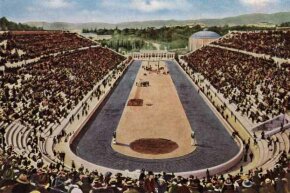
In April 1896, Athens, Greece, hosted the first Olympic Games of the modern era. And nearly lost everything in the process. The country was already bankrupt when it took on the competition, but the relatively new royal family believed the games would boost its popularity. (The Greek royal family was actually from Denmark).
Kicking off an Olympic tradition, organizers grossly underestimated the cost of hosting the games. The perceived cost of 585,000 drachmas (about $74,000 in 1896) to prepare for the competition ballooned to 3,740,000 drachmas, the equivalent of $448,000. Much of the overage was attributed to the expense of restoring Athens’ ancient stadium [source: Jennings, Zarnowski].
9: 1924 Paris Summer Olympics
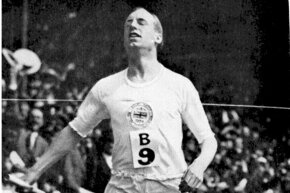
After what could be deemed several decades of false starts — few participating countries, thin crowds and nebulous accounting figures — the Olympics Games finally demonstrated a strong showing in 1924. Host city Paris, France, welcomed 44 participating nations to the global competition and spectators flocked to the event, averaging about 60,000 each day [source: Zarnowski].
Yet even as the response to the 1924 Olympic Games appeared full of promise, there were financial warning signs. Preparation costs were so high that local insurance companies offered policies against the estimated total receipts, of up to 10 million francs [source: Zarnowski].
8: 1976 Montreal Summer Olympics
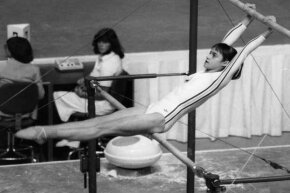
“The Olympics can no more have a financial deficit than a man can have a baby,” declared the mayor of Montreal before opening of these games in 1976. Boy, was he wrong. The Montreal Olympics went down in history as a notorious money-loser, scaring off many cities from bidding for the games in the future.
These Olympics were budgeted at a modest CA$120 million (U.S. $110 million), but construction overruns resulted in a CA$922 million deficit that overwhelmed the special tobacco tax expected to fund most of the debt. Building costs included a stadium, a full-fledged Olympic Village with apartment buildings, outdoor and indoor recreational facilities, and a massive velodrome.
No wonder that in 1977, when the Olympic stadium began its second life as home to the Montreal Expos Major League Baseball team — and was dubbed the Big O in homage to its storied start — Canadians opted to call it the Big Owe instead. Millions more were spent upgrading the stadium and on a retractable roof that never worked. By the time the debt was paid off 30 years later in 2006, the combination of capital and interest had cost the city CA$3 billion [sources: CBC News, CTV Montreal]. To add insult to injury, this is the only Olympics where the host country did not win any gold medals.
7: 1980 Lake Placid Winter Olympics

“Extreme wish lists.” “Everything they can get.” These were just two of the phrases the Lake Placid Olympic Organizing Committee’s financial controller used to describe the organizers of the 1980 Olympic Winter Games in Lake Placid, N.Y. An Associated Press article from 1978 noted the Olympic budget had already escalated from $80 million to $150 million [source: Seymour].
By the time the Olympics were over, Lake Placid was $6 million in debt — an astounding amount for an incorporated village with a tax base of about 3,000 residents. Owing a reported 1,600 creditors, the city was unable to get further aid from the federal government, which had already spent approximately $90 million on the Olympics. That’s when the state of New York stepped in. In return for several Olympic-sized assets, including the speed skating rink, Olympic fieldhouse and a series of ski jumps, the state agreed to pay off the debt [source: Seymour].
Still, Lake Placid holds the honor of being one of only three cities in the world to twice-host the Winter Olympics, along with St. Moritz, Switzerland, and Innsbruck, Austria [sources: Village of Lake Placid, Johnson].
6: 1992 Albertville Winter Olympics

When Albertville, France, decided to boost its lagging tourism numbers by bidding (successfully) for the 1992 Winter Olympics, 13 other nearby towns in the French Savoy Alps saw that as a way to get in on the action too.
The French government spent more than $1 billion propping up the region’s infrastructure between this series of small towns; the idea was to make it possible for athletes and spectators to easily traverse the 620 square kilometers (240 square miles) across which 57 Olympic events were held [source: CNBC]. (Only the opening and closing ceremonies and some skating events were actually held in Albertville.)
The government spent another $189 million building and improving sports venues. While some the towns garnered more tourists because of improved transportation, both during the Olympics and in the years that followed, Albertville didn’t see any long-term boom. The French government was left with another legacy altogether: a $67 million loss and decades of debt [source: CNBC].
5: 1998 Nagano Winter Olympics

Nagano, Japan, a city of 378,000, spent a whopping $10.5 billion in preparation for the games, thanks in part to the construction of a bullet train to shuttle spectators between Nagano and Tokyo in 90 minutes, about half the typical time. But the bullet train had the unfortunate effect of encouraging tourists to book hotel rooms in Tokyo as opposed to Nagano. This earned the 1998 event the nickname, “The Commuter Olympics” [sources: Payne, The Economist].
As the games neared, the Nagano Organising Committee had to cancel a quarter of the 16,000 Nagano hotel rooms it had reserved due to low demand. Nearby ski villages reported that instead of being at 80 percent occupancy — the normal level — they were at a mere 60 percent occupancy as regular tourists steered clear of slopes presumably crowded with Olympic tourists. In the end, the Olympic Games didn’t bring in the crowds nor did it boost tourism as the city had planned [source: The Economist].
The games ran at a loss but the full cost may never be known. During the bidding process, the Nagano Organising Committee plied International Olympic Committee members with first-class airline tickets, stays at luxurious resorts, and pricey entertainment. Later, a member of the bid committee ordered the records — all 90 volumes of them — to be burned. Nagano representatives insisted about $18 million was spent on the Olympic bid, but critics say the figure was closer to $66 million [source: MacIntyre].
4: 2000 Sydney Summer Olympics
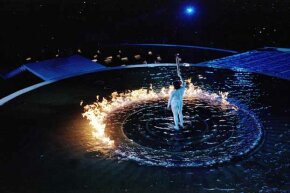
Although most Australians knew hosting the 2000 Summer Olympic Games was an expensive proposition, most thought the benefits — namely, a long-term boost in tourism — would outweigh the financial risk. Millions watched the Olympic opening ceremonies, a symbolic fruition of Sydney’s $3.8 billion Olympic preparation outlay. A third of that cost was born by taxpayers [source: CNBC].
However, lagging visitor numbers during the Olympics foreshadowed a different fate. While the games were largely considered successful, the 132,000 tourists expected to stay in Sydney during the 17-day event never materialized. Instead, there were a mere 97,000 visitors. Tourists who weren’t interested in the Olympic Games canceled or delayed their visits for fear of crowds [source: Saunders].
And what about the 8 to 10 million tourists a year who were forecast to visit Sydney following the Olympics? They didn’t show up, either. At least not in the expected droves; instead, a steady 2.5 million visitors have been touring the region, far fewer than the country had once hoped [source: Saunders].
3: 2004 Athens Summer Olympics
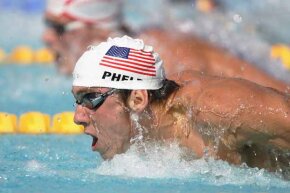
Athens hosted the Summer Olympics a second time more than a century later, but with a much more disastrous financial result. While the official cost was $4.6 billion, the actual price tag may have been as high as $15 billion for specialized athletic complexes that included the Olympic Beach Volleyball Center and Olympic Tennis Center [source: Athens Info Guide, CNBC].
After the last spectators left, many of the venues were never used again. In 2012, a reporter witnessed a smattering of individuals jogging around Athens’ Olympic Sports Complex, dodging windswept debris and a series of rusty locked gates along the way. Many of the complex’s amenities, including its tennis courts were shuttered. Worse, she learned that a restaurant constructed specifically for competitors and dignitaries was in business for a single hour to host the Greek prime minister. New kitchen equipment and chairs in their original packaging lay abandoned inside the building eight years later [source: Smith].
Athens’ Olympic build was funded by the socialist country’s public investment budget, a move that has taxpayers still footing the bill. Some believe paying for the Olympics helped fuel Greece’s economic crisis in 2009 [source: CNBC].
2: 2006 Turin Winter Olympics
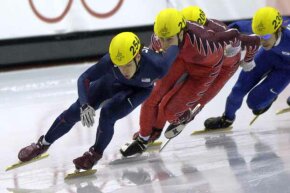
In the months leading up to the 2006 Winter Olympic Games, the organizing committee in Turin, Italy, struggled with some tough choices. Faced with funds falling $95 million short (at one time the shortfall climbed to as much as $167 million) and threatened with bankruptcy, the organizers of the world’s largest athletic competition started canceling Olympic parties, and cutting travel and promotional budgets. And then they got creative [source: Kahn].
Instead of hosting the Paralympics — a disabled athletic competition traditionally held following the Olympics — Turin sold the rights to a private-public company for about $40 million. Still, the income wasn’t enough. So the Italians launched a lottery game to quickly raise additional funds. This last-ditch effort lessened the gap, but when the games were over Turin was left with about $49 million in debt. Since then, it has attempted to sell some of the specially constructed Olympic competition venues in hopes to eventually break even [source: Kahn].
1: 2010 Vancouver Winter Olympics
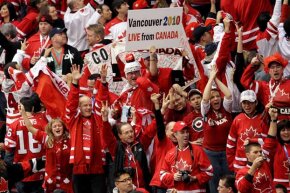
There were a few hiccups along the way but the 2010 Olympic Winter Games in Vancouver, Canada, seemed worth the trouble. Case in point: Even though the city had to step in with financing after the Olympic Village’s developer ran out of credit, Canadian athletes won a record 14 gold medals, including the Canadian holy grail, the gold in ice hockey.
Unfortunately, just as the afterglow of the Canadian athletes’ performance began to wane, Vancouver was left in a financial pickle.
Vancouver had to grapple with an estimated $1 billion debt, including $730 million incurred by the Olympic Village bailout [source: CNBC]. To recoup some of the cost, the city began marketing the Olympic Village as an environmentally friendly residential neighborhood, hoping to convince buyers to move into the many condos that sat empty. They received only a tepid response.
Sales of luxury condos in the Olympic Village’s 16 buildings (now known as Millennium Water) were so slow that the project went into receivership and the complex was turned over to Ernst and Young, the firm charged with recouping as much of the city’s debt as possible. Even so, the city and its creditors aren’t expected to ever fully recover its Olympic expenses [sources: Austen, CNBC].